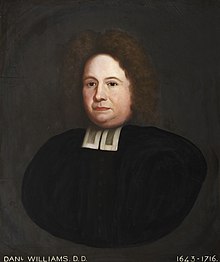Daniel Williams (theologian)
| Daniel Williams | |
|---|---|
 |
|
| Religion | Christianity (Presbyterianism) |
| Personal | |
| Born | 1643 Wrexham, Denbighshire |
| Died | 26 January 1716 Hoxton, London |
| Senior posting | |
| Based in | Ireland, England and Wales |
The Rev Dr Daniel Williams (c.1643 – 26 January 1716) was a British benefactor, minister and theologian, within the Presbyterian tradition, i.e. a Christian outside the Church of England. He is known largely for the legacy he left which led to the creation of Dr Williams's Library, a centre for research on English Dissenters.
Williams was born in Wrexham, Denbighshire, Wales, and was a cousin of Stephen Davies, minister at Banbury. He became a preacher by the age of nineteen: details of his education are unknown, though it was probably cut short by his refusing to conform to the state church, Anglicanism, when Charles II was restored to the throne.
He ministered in Ireland from 1664 to 1687. This posting was a result of his accepting an invitation from the Countess of Meath to be her chaplain. He was a regular preacher to Drogheda's joint Presbyterian–Independent congregation (1664–67) and then became Samuel Marsden's colleague at the congregation at Wood Street, Dublin (1667–87). He acted as a peacemaker amongst the Scottish Presbyterians, fiercely opposed Catholicism and helped to maintain the Presbyterians' union with the other Dissenting congregations in Ireland, as well as exorcising a house by prayer in 1678 (as recounted by Richard Baxter).
On a new outbreak of the Troubles and after being abandoned by Gilbert Rule (a Scottish exile, and Williams' assistant since 1682), Williams left for London in September 1687. There he became an influential Dissenter, becoming friends with the leading ministers Richard Baxter and John Howe and twice being invited to preach before the Lord Mayor of London, the Independent Sir John Shorter. At a meeting at Howe's house in May 1688 as to the making an address of thanks to James II for his Declaration of Indulgence, Williams opposed any such address since (in his words) "it were better for [the Dissenters] to be reduc'd to their former Hardships, than declare for Measures destructive of the Liberties of their Country" and likely to cause an open split with the Church of England. He refused to be convinced to return to Ireland by the Dublin congregation, and spent the rest of his career in London, where he advised William III on Irish matters.
...
Wikipedia
